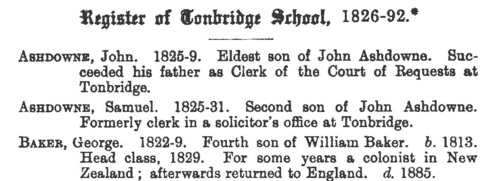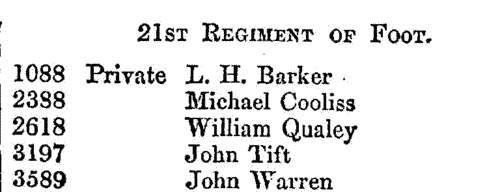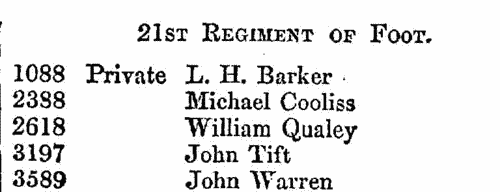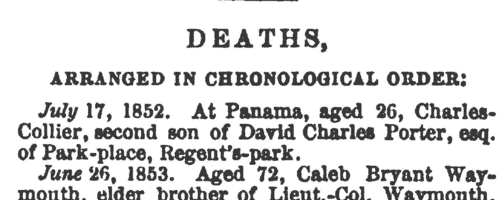Add this eBook to your basket to receive access to all 2,031 records. Our indexes include entries for the spelling kelly. In the period you have requested, we have the following 2,031 records (displaying 771 to 780): These sample scans are from the original record. You will get scans of the full pages or articles where the surname you searched for has been found. Your web browser may prevent the sample windows from opening; in this case please change your browser settings to allow pop-up windows from this site. Victoria Intestates
(1853)
The probate courts of the Australian colonies furnished returns of estates of deceased intestates, giving full name, colonial residence, supposed British or foreign residence of family (often unknown, or left blank), amount of the estate and how much had been disbursed and how. The date of death is often stated, and if by accident, suicide or crime. Names were carried forward from return to return until the estate was expended or exhausted. | Sample scan, click to enlarge

|  Outstanding British artillerymen
(1849-1854) Outstanding British artillerymen
(1849-1854)
Non-commissioned officers and men of the Royal Artillery discharged and recommended for medals and gratuities. The lists state rank, name, battalion or corps, date of recommendation, date awarded, and total length of service (in years and days), with length of foreign service (in years and months) and as serjeant and staff serjeant (in years and months). The lists themselves are basically of recommendations, then annotated to show award of medal and/or gratuity, which in most cases naturally followed. Where an award was not made, the reason is usually given: there is a column showing when the man became non-effective, through discharge, or had been deprived of the award for some reason. Where a man's name is crossed through it should not be assumed that he was deleted from the list: sometimes the name is crossed through when the medal has been dispatched. The final column on the right indicates whether the man was granted a pension on discharge. (The sample scan is from 1847) | Sample scan, click to enlarge

| Ticket-of-Leave Men
(1853-1854)
1205 convicts (1157 men, 48 women) were granted tickets-of-leave giving them conditional pardon from 10 October 1853 to 11 July 1854. This return gives full name, where and when convicted, offence, sentence in years, date of licence and annuity. Nine of the men's licences were revoked for fresh offences. | Sample scan, click to enlarge

| Bankrupts' Assignees
(1854)
Assignees of bankrupts' estates (usually principal creditors and/or close relatives of the bankrupt) in England and Wales | Sample scan, click to enlarge

| Bankrupts' Estates
(1854)
Transfers of bankrupts' estates in England and Wales to assignees | Sample scan, click to enlarge

| Boys entering Tonbridge School
(1854)
W. O. Hughes-Hughes, late Assistant-Master of Tonbridge School, prepared this edition of the school register. The Kent grammar school was founded by royal charter in 1553, but the surviving register commences with the names of 69 boys called over on Skinners' Day 1826. After that they are arranged alphabetically by quarter to 1833, and thereafter by term of entry. Each entry gives, where known: the boy's surname (in capitals) and full christian name(s); the years when at the school; father's name; year of birth; school honours; and a resume of his subsequent career. | Sample scan, click to enlarge

| British soldiers killed at Inkerman
(1854)
Sebastopol in the Crimea was the great Russian naval arsenal on the Black Sea. A combined assault by British, French and Turkish troops resulted in the reduction of Sebastopol and led to the Treaty of Paris of 27 April 1856, guaranteeing the independence of the Ottoman Empire. In the battle of Inkerman, of November 1854, the Russian troops made an ultimately unsuccessful attack on the allied army. In December the War Office issued lists of soldiers killed and wounded at Inkerman: there are separate returns for 2 to 6 November, 7 to 20 November, and 21 to 26 November, as well as one for soldiers missing, and one for members of the Naval Brigade killed and wounded. This is the list of British soldiers killed at Inkerman 2 to 6 November 1854. | Sample scan, click to enlarge

| British soldiers wounded at Inkerman
(1854)
Sebastopol in the Crimea was the great Russian naval arsenal on the Black Sea. A combined assault by British, French and Turkish troops resulted in the reduction of Sebastopol and led to the Treaty of Paris of 27 April 1856, guaranteeing the independence of the Ottoman Empire. In the battle of Inkerman, of November 1854, the Russian troops made an ultimately unsuccessful attack on the allied army. In December the War Office issued lists of soldiers killed and wounded at Inkerman: there are separate returns for 2 to 6 November, 7 to 20 November, and 21 to 26 November, as well as one for soldiers missing, and one for members of the Naval Brigade killed and wounded. This is the list of British soldiers wounded at Inkerman 2 to 6 November 1854. | Sample scan, click to enlarge

| Deaths, Marriages, News and Promotions
(1854)
Death notices and obituaries, marriage and birth notices, civil and military promotions, clerical preferments and domestic occurrences, as reported in the Gentleman's Magazine. Mostly from England and Wales, but items from Ireland, Scotland and abroad. July to December 1854
| Sample scan, click to enlarge

| Dissolutions of Partnerships
(1854)
Trade partnerships dissolved, or the removal of one partner from a partnership of several traders: in England and Wales
| Sample scan, click to enlarge

|
Research your ancestry, family history, genealogy and one-name study by direct access to original records and archives indexed by surname.
|












